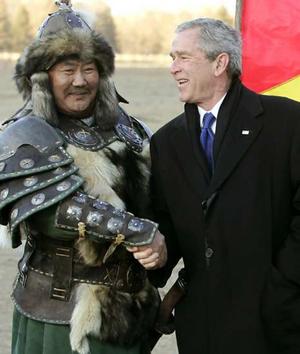George W. Bush, Liberty, and Freedom in Mongolia
President George W. Bush shakes hands with a Mongolian cultural performer. Photo: Reuters For perhaps the first time in my backpacking life, I did not need a visa, but my fellow travelers from other countries did. This is because the United States of America and Mongolia are friends. When I visited the National Museum of […]
President George W. Bush shakes hands with a Mongolian cultural performer.
Photo: Reuters
For perhaps the first time in my backpacking life, I did not need a visa, but my fellow travelers from other countries did. This is because the United States of America and Mongolia are friends. When I visited the National Museum of Mongolia, I was surprised to see a big photo of George W. Bush and his wife Laura, surrounded by a Mongolian family in traditional dress. I was even more surprised to learn about the context of his visit and content of his speech.
This is where he spoke, on the steps of Ulaan Bataar’s parliament building, in the city center.
George W. Bush visited Mongolia in 2005. I think that was a relatively good year for him. He had just been re-elected, the “mission” in Iraq had been “accomplished” for about two years, and the economy was doing just fine. I remember watching commentary on The Daily Show with Jon Stewart, which featured a scoreboard of Liberty vs. Freedom, during his re-inauguration speech.
I think that liberty and freedom is a message that resonated well in Mongolia, a country that was dominated by the Soviet Union from about 1920 – 1990. In the early 1990s, citizens held hunger strikes and eventually gained freedom.
I spoke with a Mongolian woman who had been an elementary school teacher in the 1970s and 1980s. Once Mongolia became free, she and her husband started a cashmere processing and exporting company. This entrepreneurial venture earned them enough money to send their children to the United States for high school and university. One of her daughters is married to an American, and she now has three young granddaughters in California.
Beyond personal relationships, the United States and Mongolia also have a military alliance. Mongolia has sent soldiers to Iraq, which this report from the Sydney Morning Herald describes.
Bush praises Mongolian hordes for revisiting Iraq
By Hamish McDonald Herald Correspondent in Beijing and agencies
November 22, 2005George Bush yesterday became the first US president to visit Mongolia, thanking the heirs of Genghis Khan for sending troops to join his “war against terror”.Mr Bush stopped in the bitterly cold Mongolian capital, Ulan Bator, for four hours on his way home from an Asian tour that has taken him to Japan, South Korea and China.
In a speech to Mongolian leaders and members of parliament at the central government building, Mr Bush said Mongolians had stood with Americans as “brothers in the cause of freedom”.
The nation of 2.8 million mostly nomadic people has sent 160 soldiers to Iraq – the first Mongolian soldiers in the country since a son of Genghis Khan sacked Baghdad in 1258 and slaughtered most of its Muslim population.
The number is small but White House officials pointed out to reporters that, per capita, only two other countries – Britain and Denmark – had sent more of their soldiers to Iraq.
Mr Bush said US forces were proud to serve with Mongolia’s “fearless warriors” and specifically thanked two Mongolian soldiers who shot dead a suicide bomber trying to drive a truck full of explosives into a coalition mess tent in southern Iraq.
In addition, Mr Bush singled out the Mongolians for their dogged adherence to democracy since shaking off decades of Soviet control in 1990. The country held its third contested presidential elections in May this year.
“Free people did not falter in the Cold War, and free people will not falter in the war on terror,” he said, adding: “Like the ideology of communism, the ideology of Islamic radicalism is destined to fail – because the will to power is no match for the universal desire to live in freedom.”
After the speech Mr Bush talked with the Mongolian President, Nambaryn Enkhbayar, and visited a yurt – a traditional felt tent – to see a performance of traditional throat singing and dances.
By contrast, Mr Bush achieved few specific results from his weekend visit to Beijing. The Chinese President, Hu Jintao, addressed US trade grievances with promises of co-operation that were short on details and timetables, and insisted that China was already a democracy with free elections.
Later Mr Bush was able to cite only the fact that Mr Hu had mentioned human rights at all in their joint press statement after talks. “Those who watch China closely would say that maybe a decade ago, a leader wouldn’t have uttered those comments,” he said. “He talked about democracy.”
But the US Secretary of State, Condoleezza Rice, who accompanied Mr Bush, complained that “we’ve certainly not seen the progress that we would expect” on a months-old US request for action by China on specific human rights cases.

